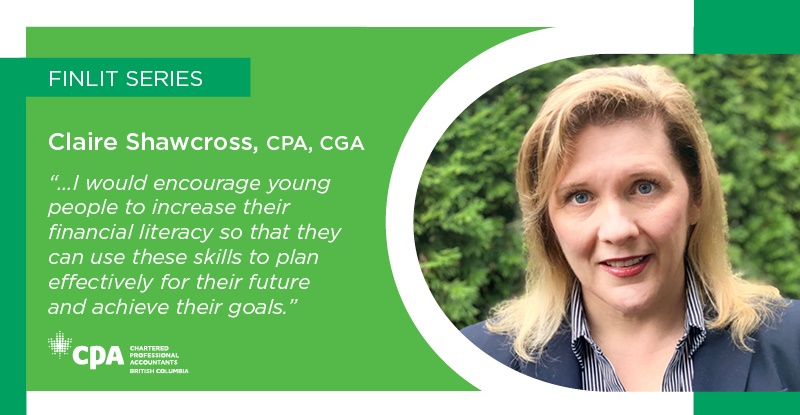
If you would like to receive a financial literacy presentation geared to elementary, high school, or post-secondary students, the CPA Financial Literacy Program offers free workshops. Contact our FinLit team to receive more information on how to book a workshop or connect us with your child’s teacher.
Canadians recently reached a dubious high point – collectively, we have amassed $100 billion in credit card debt. Often difficult to pay down, this type of debt can pose a challenge for anyone who incurs it, particularly for young people who have limited knowledge of credit card interest rates as well as how to best approach debt repayment.
Financial literacy volunteer Claire Shawcross, a Chartered Professional Accountant, regularly gives presentations to high school students to increase their financial literacy, often discussing topics such as how to leverage debt to their advantage and how to use credit cards properly. We recently caught up with Claire about her volunteerism.
What motivated you to volunteer with the CPA Financial Literacy Program?
"I found the idea of bringing financial knowledge into the day-to-day lives of individuals intriguing. In part, because our public practice firm would repeatedly work with younger professionals to “fix” their credit rating. They just didn’t know that when they were in their late teens and early twenties that some of their choices could impact them so dramatically in the future.
I have presented approximately a dozen FinLit sessions to youth with the CPA Financial Literacy program. I deliver the information provided to support each topic, and I always include a bit of realism – for example, if we’re discussing how to put together a monthly budget, I provide actual examples of monthly costs, such as rental costs in the Lower Mainland. Many students have come up to me afterwards and said they were shocked about a variety of items presented during the session."
What is your most memorable story as a financial literacy presenter?
"I had a Grade 11 student comment that they had no idea that credit was a good thing if used correctly. This student had been raised in a household where debt was not considered a good thing.
But discussing credit ratings and the necessity of assuming debt in order to repay it – to prove your ability to fulfill your financial commitments (like paying back debt) when applying for loans and mortgages – put a different light on it. I emphasized that it’s possible to strike a nice balance between assuming a moderate amount of debt and leveraging that debt for our own use."
In terms of money management, what are some things you wish you had known and done when you were younger?
"There wasn’t a lot, as my parents were both savers and investors. However, I wish I had better understood credit card use (there is always a bill that will need to be paid and if you don’t pay that money back on time, you will be charged interest). But after a couple of months of budget over-run I was on track pretty fast (with the help of my mom and dad).
Since then, I ensure that I only incur “good” debt – the kind that can help generate income or improve my net worth, like a mortgage for a house. This is in stark contrast to “bad” debt, which is incurred when you use credit or a loan to purchase something that will go down in value and won’t help you generate income, like clothing or a new smartphone."
What tips do you have for the younger generation on preparing themselves financially for the future?
"No goal is unattainable financially. However, goals take time to achieve and this can impede your immediate satisfaction. When we live in a society where we can order something online one day and receive it the next, it is hard to be satisfied with a future acquisition that might seem out of reach, like a vacation, car, or house. But you have the power to obtain it if you set up a proper budget and timeline."
What are your top tips to young people plan for a successful retirement?
"Don’t ever assume that the government is going to take care of you and do not assume that an inheritance is a retirement plan. You should get into the habit early of putting aside something for retirement – a dollar invested today by a young person will grow exponentially between the age of 20 and 65, and anything else is gravy."
Why is financial literacy especially important during this uncertain time?
"COVID-19 and the ensuing need to support our citizens over the last several months comes with a bill which will have to be paid by, I am sure, several generations to come. This is where individuals – and particularly young people – need to be smart with their credit, their earnings, their tax planning, and their savings – as disposable income may be impacted.
Bearing all of this in mind, I would encourage young people to increase their financial literacy so that they can use these skills to plan effectively for their future and achieve their goals!"
Let your child’s teacher and school know that CPABC offers free and unbiased financial literacy workshops in their classroom. Contact our FinLit team to learn more about financial literacy presentations geared to elementary, high school, or post-secondary students.
Leah Giesbrecht is a communications specialist with the Chartered Professional Accountants of BC.



